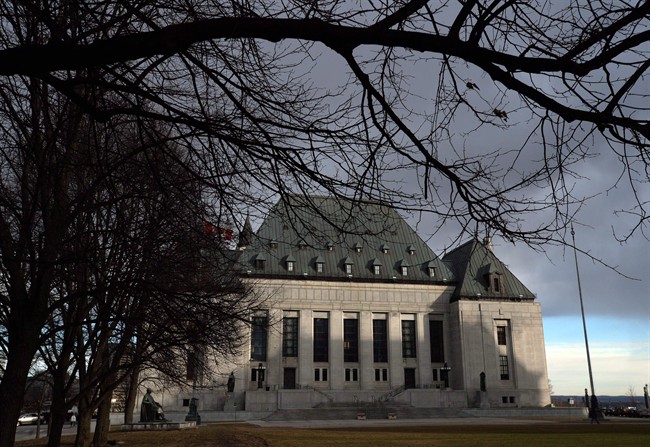OTTAWA – The federal government is pleading for more time to respond to the Supreme Court of Canada’s landmark ruling on doctor-assisted death.

During an oral hearing Monday, Crown lawyer Robert Frater said the government needs six more months to comprehensively respond to the judgment, which recognized the right of consenting adults enduring intolerable physical or mental suffering to end their lives with a doctor’s help.
READ MORE: Federal government in no apparent hurry on assisted dying
The court suspended last February’s decision for one year to allow Parliament and provincial legislatures to respond, should they choose, by bringing in legislation consistent with constitutional limits it set out.
Six additional months is not a long time in terms of the democratic process, Frater said, noting that the government is aware its request is unusual – but not unprecedented.
“Parliament can choose to do any number of things,” Frater told the nine-judge panel.
“I think the government has been quite clear that it is trying to be open to all options. The difficulty in this case is that the issues are so enormous and so complex … it is a new Parliament, they have to grapple with the issues.”
Last month, the Liberals established a special Commons-Senate committee to explore the issue of doctor-assisted death in hopes of drafting a new law ahead of its prospective new August deadline.
- Life in the forest: How Stanley Park’s longest resident survived a changing landscape
- ‘They knew’: Victims of sexual abuse by Ontario youth leader sue Anglican Church
- Carbon rebate labelling in bank deposits fuelling confusion, minister says
- Buzz kill? Gen Z less interested in coffee than older Canadians, survey shows
The committee is to report with legislative recommendations by Feb. 26, according to the motion that sparked its creation, though MPs have not yet been assigned to it.
Committee members from the Senate are free to start their work now and the group will have to meet the deadline set out, Frater added.
He also acknowledged the rule of law requires the federal government respect the judgment handed down by the Quebec Court of Appeal which “brought clarity to the situation” in the province.
It overturned a lower court decision aimed at suspending the implementation of Quebec’s law on assisted-death.
“If this further six months is granted, the rule of law will mean that that conduct is not a crime in Quebec,” Frater said.
READ MORE: Health advocates say assisted suicide debate should fuel changes to end-of-life care
Lawyer Joseph Arvay, who represents those who fought for the right to assisted death, adamantly opposed the extension.
The B.C. Civil Liberties Association and individuals who spearheaded the case argue an extension would be a setback for people enduring unbearable pain.
“We have really suffering people,” Arvay said.
READ MORE: Quebec’s top court upholds province’s assisted-dying law
“Surely, in deciding whether to grant the extension, you have to decide whether the government’s request for an extension, in any way trumps that suffering,” he said.
Arvay also attempted to quash concerns about what would happen if the Supreme Court does not grant an extension, allowing the Criminal Code provisions to fall next month.
“There’s not going to be a rush to the doctors’ offices to die on Feb. 6,” he said.
“Most people don’t want to die … all physicians will be very reluctant to accede to the request unless a compelling case is made.”
The Supreme Court reserved its decision.
Tell us your story: Will you or someone close to you be affected by the Supreme Court’s decision on assisted death? We want to hear from you.
Note: We may be in touch if we have questions but won’t publish anything you send us in response to this story without your permission.



Comments